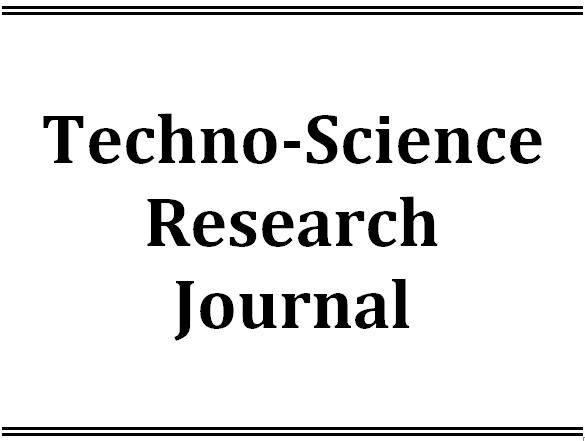Latest Issue
The Negative Experiences of Low-Income Citizen Commute and Their Intentions Toward Public Bus in Phnom Penh
Published: December 31,2025Reliability Study on the Placement of Electric Vehicle Charging Stations in the Distribution Network of Cambodia
Published: December 31,2025Planning For Medium Voltage Distribution Systems Considering Economic And Reliability Aspects
Published: December 31,2025Security Management of Reputation Records in the Self-Sovereign Identity Network for the Trust Enhancement
Published: December 31,2025Effect of Enzyme on Physicochemical and Sensory Characteristics of Black Soy Sauce
Published: December 31,2025Activated Carbon Derived from Cassava Peels (Manihot esculenta) for the Removal of Diclofenac
Published: December 31,2025Impact of Smoking Materials on Smoked Fish Quality and Polycyclic Aromatic Hydrocarbon Contamination
Published: December 31,2025Estimation of rainfall and flooding with remotely-sensed spectral indices in the Mekong Delta region
Published: December 31,2025Feasibility Study of Recycled Waste Plastic Application in Bituminous Concrete
-
1. Faculty of Civil Engineering, Institute of Technology of Cambodia, Russian Federation Blvd., P.O. Box 86, Phnom Penh, Cambodia
Received: June 22,2022 / Revised: / Accepted: September 28,2022 / Available online: December 31,2022
The road is one of the most fundamental forms of social infrastructure and plays a critical role in boosting the local economy. However, the route has been used in many different loading types, affecting their performance. The increase in traffic in commercial vehicles is the main factor causing road damage. This problem involves us thinking about improving the pavement characteristic and quality by using polymer modification materials that satisfy both the strength and economic aspects. Thus, this study aims to find the best combination of bitumen and plastic for long-term performance by comparing the stability of conventional and modified bituminous concrete and investigating the behavior of bituminous concrete mixed with bottle caps as recycled plastic waste in the wet and dry processes. The various percentage of recycled plastic waste of bottle caps of 2%, 4%, 6%, 8%, 10% of the binder, and 3%, 4%, 5%, 6%, 7%, 8% of the binder are used in the dry process and wet process, respectively. The sample of experiment preparation was mixed with a selection bitumen 60/70 and aggregate blending (ASSHTO T 27) of fine and coarse aggregate sieve analysis. Marshall test properties such as Stability, Flow value, Air void, etc., are used to determine the optimum recycling of plastic waste content. The result indicated that the modified binder provides better engineering properties for the wet and dry processes. The recommended proportion of plastic used in the wet process is between 4% to 6% of bitumen content due to the characteristic of the binder and the marshall test result. The recommended proportion of plastic used for the dry process is 6%. It improves the base bitumen and stability, which resist deformation, rutting, and shear stress. The road is one of the most fundamental forms of social infrastructure and plays a critical role in boosting the local economy. However, the route has been used in many different loading types, affecting their performance. The increase in traffic in commercial vehicles is the main factor causing road damage. This problem involves us thinking about improving the pavement characteristic and quality by using polymer modification materials that satisfy both the strength and economic aspects. Thus, this study aims to find the best combination of bitumen and plastic for long-term performance by comparing the stability of conventional and modified bituminous concrete and investigating the behavior of bituminous concrete mixed with bottle caps as recycled plastic waste in the wet and dry processes. The various percentage of recycled plastic waste of bottle caps of 2%, 4%, 6%, 8%, 10% of the binder, and 3%, 4%, 5%, 6%, 7%, 8% of the binder are used in the dry process and wet process, respectively. The sample of experiment preparation was mixed with a selection bitumen 60/70 and aggregate blending (ASSHTO T 27) of fine and coarse aggregate sieve analysis. Marshall test properties such as Stability, Flow value, Air void, etc., are used to determine the optimum recycling of plastic waste content. The result indicated that the modified binder provides better engineering properties for the wet and dry processes. The recommended proportion of plastic used in the wet process is between 4% to 6% of bitumen content due to the characteristic of the binder and the marshall test result. The recommended proportion of plastic used for the dry process is 6%. It improves the base bitumen and stability, which resist deformation, rutting, and shear stress.

